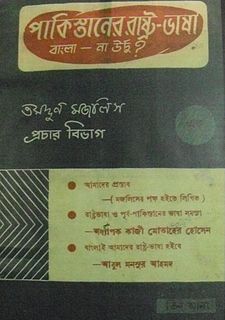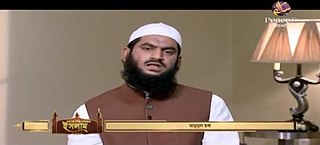
Language Movement Day, also called State Language Day or Language Martyrs' Day, is a national holiday of Bangladesh taking place on 21 February each year and commemorating the Bengali language movement and its martyrs. On this day, people visit Shaheed Minar to pay homage to the movement's martyrs and arrange seminars discussing and promoting Bengali as the state language of Bangladesh.

The Bengali language movement was a political movement in former East Bengal advocating the recognition of the Bengali language as an official language of the then-Dominion of Pakistan in order to allow its use in government affairs, the continuation of its use as a medium of education, its use in media, currency and stamps, and to maintain its writing in the Bengali script.

Tajuddin Ahmad was a Bangladeshi politician and statesman. He led the Provisional Government of Bangladesh as its prime minister during the Bangladesh Liberation War in 1971 and is regarded as one of the most instrumental figures in the birth of Bangladesh.

Shawkat Ali was a politician and a leader of the Bengali Language Movement. He was one of the founders of Awami Muslim League - which later became Awami League and is now the Bangladesh Awami League. He was a member of all three Rastrabhasa Sangram Parishad. He was also the Chief Organizer of Dhaka City Awami League during the 1950s. His house in 150, Chawk Moghultuly, Dhaka was the center for many activities and meetings during the Language Movement. He died of a stroke on August 18, 1975. He is buried in Jurain graveyard in Dhaka.
Shahed Ali was a Bangladeshi litterateur and cultural activist. Aside from being an educationist and his journalism, he was one of the founders of the nationwide Tamaddun Majlish which initiated the Bengali language movement. He edited multiple magazines, was the founding secretary of the Islamic Academy, and is best known for his magnum opus, the short story Jibrailer Dana.

Muhammad Mansur Ali was a Bangladeshi politician who was a close confidant of Sheikh Mujibur Rahman, the founding leader of Bangladesh. A senior leader of the Awami League, Mansur also served as the Prime Minister of Bangladesh in 1975.
Khandakar Abdur Rashid, better known as Abdur Rashid Tarkabagish was a Bangladeshi politician and Islamic scholar. His career spans from the anti-colonial independence movement to the establishment of both Pakistan and Bangladesh. Tarkabagish was the second president of the All Pakistan Awami Muslim League, and served as a member of the National Assembly of Pakistan and later the Parliament of Bangladesh. Despite being a member of the treasury bench, he opposed what he considered to be the repressive mentality of the Nurul Amin government towards the Bengali Language Movement.

The Tamaddun Majlish, formerly Pakistan Tamaddun Majlish, is an Islamic cultural organization in Bangladesh, established in 1947 by Principal Abul Kashem in the former East Pakistan. It was one of the founding organizations of the Bengali Language Movement.

Mohammad Abul Kashem is generally considered as a pioneer and the architect of the historic Language Movement of Bangladesh. He was also a politician, author and an eminent educationist. He founded the Islamic-oriented Bengali cultural organisation Tamaddun Majlish.
The Rashtrabhasha Sangram Parishad was an organisation founded by Bengali politicians and intellectuals to agitate for the recognition of the Bengali language by the Government of Pakistan. It was established on 1 October, 1948 by Nurul Bhuiyan.It became one of the most influential groups during the Bengali Language Movement.
Nurul Haque Bhuiyan was a Bengali activist.
The Shorbodolio Kendrio Rashtrobhasha Kormi Porishod was the leading political organisation in the Bengali Language Movement of East Bengal.

The Pakistan National Congress (PNC), later known as the Bangladesh National Congress, was a political party that mainly represented the Hindus and other religious minorities in Pakistan. The party championed secularism in the Muslim-dominated state, and its electoral and organisational strength was mainly based in East Bengal.

Pakistaner Rashtra Bhasha: Bangla Na Urdu? is a small book published on 15 September 1947 by Bengali language movement pioneer Principal Abul Kashem on behalf of Tamaddun Majlish. Within one month of Pakistan's Independent by publishing this book, it demanded introduction of Bengali as one of the state language of whole Pakistan. This book also strongly advocated for Bengali as the medium of education, court language and for its use in the offices in East Pakistan.
The Khelafat Majlish, also spelt Khelafat Majlis, is an Islamist political party in Bangladesh. The party was founded in Dhaka, the capital of Bangladesh, in 1989 by Deobandi scholar Azizul Haque along with Ahmad Abdul Qadir and former leaders of the National Awami Party and Tamaddun Majlish. Since its founding, it has only ever gained one seat in the country's National Parliament. The party split into two in 2005, with Azizul Haque's faction taking the name Bangladesh Khelafat Majlish.
Harkat-ul-Jihad-al-Islami Bangladesh, [transl. Jihad movement of Islam of Bangladesh] is the Bangladeshi branch of the terrorist group Harkat-ul-Jihad-al-Islami (HuJI). It is banned in Bangladesh and is a Proscribed Organisation in the United Kingdom under the Terrorism Act 2000.

Abdul Gafur is a Bangladeshi journalist, teacher, writer and language activist of the Bengali Language Movement that took place in the erstwhile East Pakistan to make Bengali one of the state languages of Pakistan. He was one of the noted members of Tamaddun Majlish, an Islamic cultural organization which played a vital role at the start of the movement.

Maʾmūn al-Ḥaqq ibn ʿAzīz al-Ḥaqq ibn Irshād ʿAlī ad-Dākawī, or simply Mamunul Haque, is a Bangladeshi Deobandi Islamic scholar, politician, academic, writer, editor, and social reformer. He is the former Joint Secretary General of Hefazat-e-Islam Bangladesh, Secretary General of Bangladesh Khelafat Majlish, Shaykh al-Hadith of Jamia Rahmania Arabia Dhaka, Founder of Babri Mosque Bangladesh, Editor-in-Chief of Monthly Rahmani Paigam, President of Bangladesh Khelafat Youth Majlish and Khatib at Baitul Mamur Jame Mosque. He is also a leading figure in several organizations, including Rabetatul Waizin Bangladesh, an organization of Islamic speakers in Bangladesh. He is particularly popular with the hard-line speaks against atheists, secularists, anti-islamist and was arrested for leading the movement in this regard. 65 organizations including Bangladesh Awami League, Chhatra League, Jubo League have started a massive movement across the country demanding banning, arrest and exemplary punishment of him for promoting Islamic fundamentalism. In 2021, his second wife accused him of raping her.
Zobeda Khanom Chowdhury, also known as Zobeda Rahim Chowdhury, was one among the leading woman who partook in the Bengali language movement from Sylhet and a pioneering women in Bangladeshi politics.
Khan Sahib Syed Muhammad Afzal was a Bengali politician. He served as a member of both the Bengal Legislative Council and the Bengal Legislative Assembly. Afzal was noted an early supporter of the Bengali language movement.










